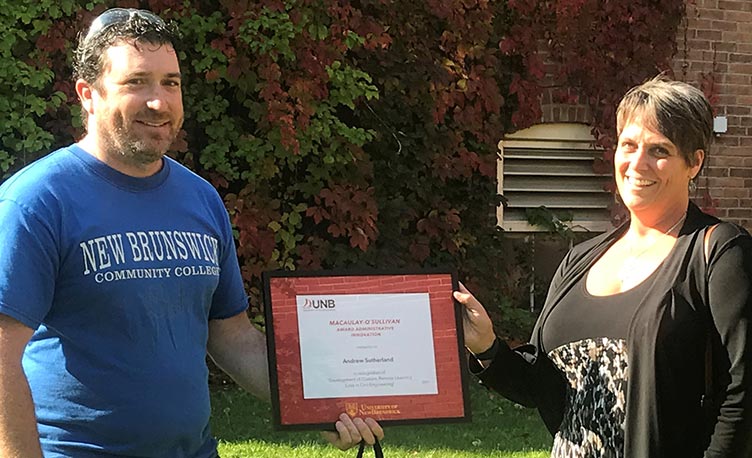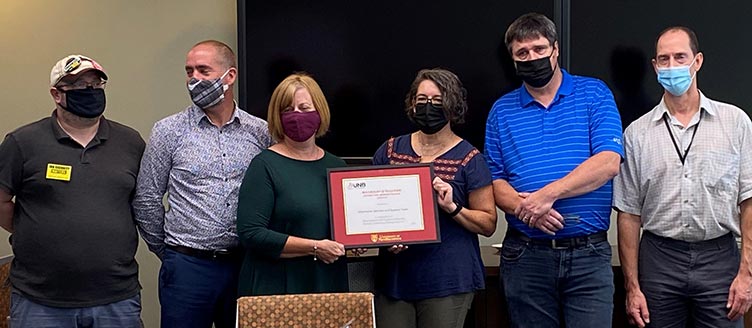Macaulay-O'Sullivan Award
Established in 2012, the Macaulay-O’Sullivan Award was aimed at (1) expanding the opportunities to honour staff and (2) creating recognition for positive, immediate and creative initiatives that have an impact on the delivery of UNB’s mission.
The awards were named in honour of Beverley F. Macaulay, UNB’s first Vice-President Administration, who served from 1960 to 1974, and his successor, James. F. O’Sullivan, who held the office from 1974 to 1999. Both of these individuals were steadfastly committed to the principles underlying these awards and each exemplified the highest level of service.
2021 Recipients
Andrew Sutherland

Civil Engineering is a hands-on discipline, so when COVID-19 closed our classrooms and labs in March of 2020 student learning was jeopardized. While we as faculty members panicked and tried to figure out how to finish off the semester meaningfully, Andrew calmly went out and immediately procured video equipment for the department (including a camera, lights, tripods, and a black background) that was later difficult to find and much more expensive. He quickly trained himself on video editing software, and within a few days he was able to start making video demonstrations of all of the remaining labs, incorporating picture-in-picture zoomed images of the measurements that the students would have taken in person, and voice-over by the professors. Engineers Canada requires that our students gain “substantial laboratory experience” for accreditation; without Andrew, we would have failed them.
As our Chief Technician, Andrew already is our go-to person for getting things done for undergraduate labs and organizing technical support for lab- and field-based research, so he is involved in every aspect of our department. During COVID, his contributions to departmental teaching and research have been outstanding. Civil Engineering taught 100% online for the 2020-2021 academic year, with all labs demonstrated as videos created by Andrew and the other technicians. Because of the overwhelmingly positive feedback from the students, some professors are thinking about keeping the videos as part of the class moving forward, providing them to students before the in-person lab so that they understand the procedures and analyses before undertaking them. Andrew also quickly procured COVID PPE and helped to develop operational plans for the labs and fieldwork so that our research could continue safely. He stayed up to date on Provincial and WorkSafeNB protocols and health bulletins and coordinated efforts to make sure that all of our labs and workspaces were safe and operational this year.
Personally, I decided that I wanted to record video lectures for Fluid Mechanics class using a lightboard this year because I thought it would be the most natural way to give a recorded lecture, and I thought it would be better for student learning and engagement. Andrew helped to design and build one for me and the students seemed to really like it, giving comments like: “the videos are really good! sometimes I get distracted by how cool the light board is”;“the light board is very effective”. Andrew has already started working on a larger one for our department to have permanently installed for future use.
Andrew’s contributions to Civil Engineering are significant and essential in a normal year; during COVID, his efforts have been exceptional. I highly recommend him for the Macaulay-O’Sullivan award.
- Katy Haralampides
Information Services & Systems

The greatest danger in times of turbulence is not the turbulence – it is to act with yesterday’s logic. – Peter Drucker
When during the height of the pandemic the Saint John Campus made the decision to welcome students, faculty, and staff back to campus in the Fall of 2020, albeit with many restrictions and precautions, the role of the Information Services and Systems team became critical to the success of that plan. The team stepped in and stepped up to address and solve the many complex issues that would arise over the coming months. As an example of change management in a time of crisis, the ISS team excelled in establishing and supporting new processes, offering outstanding administrative service to our faculty and students, and making it possible for us to begin overcoming the impact of COVID long before many other universities.
The steps needed were many and in the early stages were largely undefined, and it quickly became evident just how much needed to be done in a very tight timeframe. Our campus classrooms needed to be retrofitted to accommodate a new world of ADM (Alternative Delivery Methods); faculty and staff required training to utilize the new tools; faculty needed assistance and support to pivot their teaching methods and curriculum to accommodate a mixture of in-class and remote students; and ISS needed to develop a comprehensive support model. It was critical that we support our faculty so that they could focus on what they do best with minimal distraction or disruption.
ISS is comprised of several integrated units (Network services, Audio Visual services, Instructional Technology services, Professional Client services desktop support and Student Technology support). Managers and staff quickly identified and navigated the complex path to change and success. Working closely with colleagues at ITS and CETL in Fredericton, equipment was purchased and training was developed. Regular meetings were held with Deans and stakeholders to anticipate and address faculty concerns regarding technology, classrooms, and support. This way, we were able to constantly evaluate our successes and challenges and stay ahead of issues as they arose. One-on-one training was offered for faculty teaching on campus, in their own classrooms so that they could test and become familiar with the equipment. A pivotal element in the success of this initiative was the development of a proactive, intentional, and strategic in-class support model developed by the ISS team. Through their exceptional efforts and leadership, the ISS team has exemplified the UNB Saint John commitment to service, relationship, and teamwork.
- Laurelle LeVert
Administrative service awards
These awards recognize individuals and/or units whose efforts have substantially exceeded expectations and enabled the University to carry out its mission and provide service, especially to students, of exceptional quality. An example of this achievement would be the 2016 winner, ITS Disaster Recovery Plan, which enabled UNB to continue to operate in the event of an IT disaster.
Administrative innovation awards
These awards recognize individuals and/or units whose work has resulted in substantial improvement and/or heightened effectiveness by introducing a new process, system or product to the University community. An example of this achievement would be the 2016 winner, Event and Conference Technology Equipment Process, which developed and implemented an improved process for event and conference technology equipment requirements.
Rationale
The Macaulay-O’Sullivan Awards program has been intentionally broad in its criteria and terms of reference in an effort to attract nominations from all parts of the institution, from non-academic support units to academic and student services, from the faculties to the libraries. The program is intended to encourage exceptional administrative service on the one hand and innovative problem-solving, what might be termed “applied creativity,” on the other. In support of the goals of our strategic plan, we collectively need individuals and departments providing outstanding service and we need new approaches that are relevant, cost effective, efficient, transparent and, especially, innovative.
Overall goal
In all cases, nominations for the Macaulay-O’Sullivan Awards will be held to the highest standard of excellence. The awards will stand for exceptional service, innovation and, above all, achievement.
Criteria for administrative service awards
We invite nominations that:
- Demonstrate outstanding service, above and beyond the call of duty, to internal or external clients
- Transform university administration so it becomes exceptionally service focused
- Improve transparency, accountability and responsiveness
This category recognizes activities that achieve or exemplify one or more of the following:
- Outstanding administrative service to students
- Outstanding administrative service to internal or external service recipients
- Improved management of human, financial and/or physical resources
- Enhanced health and safety
- Provision of new services within existing budgets
- Development of a best practice
- Transferability to other departments
Criteria for administrative innovation awards
We invite nominations that:
- Have successfully introduced a new approach to workplace processes or systems
- Exemplify effective, informed, and balanced risk-taking
- Cause positive new behaviours or create new patterns of productive activity
This category recognizes initiatives that achieve or exemplify one or more of the following:
- Process innovation
- Increased efficiency
- Cost and/or time savings
- Increased productivity
- Innovative applications of technology
- Increased revenue to the institution
- Demonstrated entrepreneurship
- Transferability to other departments
Eligibility
The Macaulay-O’Sullivan Awards program is open to all UNB employees, faculty and staff: full- and part-time; permanent, casual or on contract; members of all bargaining units and non-unionized staff. Student employees are eligible provided they were employed by the University at the time the service was performed or the innovative activity or program was developed and/or substantially implemented. Members of the President's Executive Team are not eligible for nomination.
Awards will be made to individual employees or to teams, including interdepartmental or interdisciplinary teams, whose provision of exceptional service or innovative activity or program meet the criteria.
Number of awards
Up to six Macaulay-O’Sullivan Awards in any combination of Administrative Service and Administrative Innovation will be awarded in any given year across both campuses. The Selection Committee reserves the right to make fewer or no awards in any given year if nominations do not meet standards of excellence.
Nomination process
Nominations will be accepted annually by People & Culture for an activity/program developed and implemented in the two preceding fiscal years (May 1 to April 30). This year nominations will be accepted on or before June 25, 2021 for services performed or activities or programs developed and significantly implemented between 1 May 2019 and 30 April 2021.
Nominations of either individuals or teams of employees delivering a service or responsible for an innovative activity or program will be accepted. Teams may be composed of employees from more than one department or discipline.
Nominations must be made using the official form provided in this website.
Nominations require the signature of an appropriate vice-president, associate or assistant vice-president, dean or director.
Individuals or teams that are nominated must be informed of the nomination, and agree to have their name(s) go forward.
Nominations must be forwarded by the June 25, 2021 deadline to Erin Fyfe, Assistant to Associate Vice-President, People & Culture.
Selection committee
The Vice-President (Administration and Finance) will chair the Macaulay-O’Sullivan Awards Selection Committee.
The Selection Committee will be appointed by the chair and composed of at least the following:
- One member of faculty
- One member of UNB Fredericton staff
- One member of UNB Saint John staff
- One Dean/Director or equivalent
- One student
- One UNB alumnus/alumna
The Selection Committee will include representation from both campuses. Committee members will be appointed for one year at a time, but may be reappointed at the discretion of the Vice-President.
